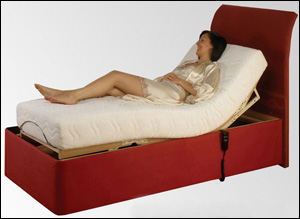 There is nothing worse than not being able to sleep. Sleep is essential for health and happiness and, without it, irritability and misery quickly surface. While we all know how important sleep is, the stress of modern life can make it difficult to switch off enough at the end of the day to achieve a good night’s rest.
There is nothing worse than not being able to sleep. Sleep is essential for health and happiness and, without it, irritability and misery quickly surface. While we all know how important sleep is, the stress of modern life can make it difficult to switch off enough at the end of the day to achieve a good night’s rest.
Thankfully, with a little preparation you can increase your chances of a restful night. Here are a few things that can help:
1 – The Bed
One of the most important things that you need to achieve a good night’s sleep is a comfortable bed. The frame itself needs to meet your needs whilst too soft or too hard a mattress may cause you to find it hard to sleep. If you find it difficult to find a comfortable sleeping position you may want to investigate adjustable beds as these can be tailored to meet your individual needs.
Your bedding is important too. You need to ensure that you have the right tog duvet for the time of year and extra layers readily available if needed. You should have a choice of pillows to establish what level of support works best for you. Your bedding should be hypoallergenic if you have allergies.
2 – The Environment
The environment in which you sleep also has a role to play in whether you achieve a good night’s sleep. Make sure that your bedroom is tidy and uncluttered, as this will have an impact on your ability to relax.
Lower the temperature of your bedroom to between 16°c and 21°c. A lower temperature sends signals to your body that it is time to go to sleep. This can also be achieved by having a hot bath, as the heat from the water will send signals to your body to lower its temperature.
Make sure that the room is as dark as you can make it. Light sends signals to your body that it is time to wake up. Even something as innocuous as the light from a streetlight or the display on a digital alarm can have an effect if your eyelids momentarily open between sleep phases. If it is difficult to eliminate all light, you may want to consider an eye mask.
Try to eliminate any noises that are keeping you awake. If you allow pets in your room at night, you may well find that they are disturbing you more than you think. Consider shutting them in another room.
If your partner snores or moves around a lot, you may want to consider sleeping in separate beds at least some of the time. It’s not terribly romantic but then neither is a simmering resentment at being woken up yet again.
3 – Routine
Following a bedtime routine can help to prepare your body for sleep. Don’t watch TV just before going to sleep as this can act as a stimulant. Instead, enjoy a glass of warm milk before heading up to the bedroom to relax. Put a few drops of lavender oil or water on your pillow and relax with a good (although not too exciting) book.
Finally, if nothing else seems to be working, you could try wearing socks to bed. There’s no logical reason for its success but having warm feet seems to work for some people.
About the author: Zoe is an avid blogger and experienced freelance writer who loves to sharing her knowledge through content on the internet. Zoe is currently writing on behalf of bed superstore Archers Sleep Centre.
Credits: Photo courtesy of Archers Sleep Centre.